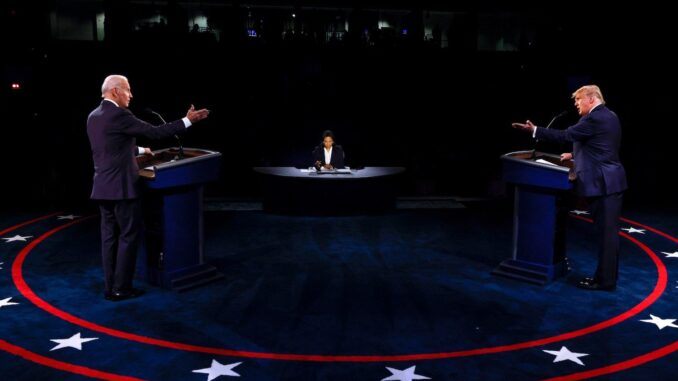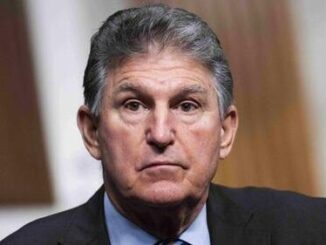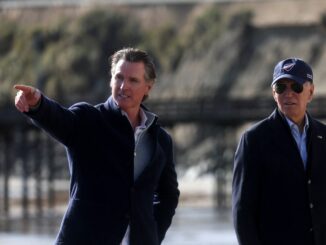
International affairs have rarely been featured in presidential debates—but this week’s showdown could be an exception.
Televised debates have become an important part of American presidential campaigns, but no one has really figured out how they matter. Millions of viewers watch the debates, and they seem to shape the popular image of the candidates, especially when a well-timed criticism lands (Ronald Reagan’s “there you go again”) or an outrageous gaffe drops (Gerald Ford’s “there is no Soviet domination of Eastern Europe”).
Policy, however, gets little discussion in debates because of time limits and the premium on articulating a simple, compelling position. Foreign policy is a particularly rare point of focus in debates, and much of what is said on the topic often distorts more than it illuminates. But this week’s debate between former President Donald Trump and President Joe Biden may be an exception.
Since the first televised debate in 1960 between John F. Kennedy and Richard Nixon, presidential candidates have generally agreed on the broad contours of American foreign policy: containment of communist adversaries, commitment to a vibrant Western alliance, a predominant U.S. global presence, and open markets for American trade and investment. Candidates competed to see who could articulate these positions most eloquently, while condemning their opponents for incompetence and insufficient commitment. Kennedy, for example, criticized Nixon for his role in the Eisenhower administration that Kennedy described as weak in allowing an alleged “missile gap” with the Soviet Union. Reagan lobbed a similar attack at Jimmy Carter for allegedly “coddling” Moscow as its military power grew.
Reagan and Carter, like Kennedy and Nixon, agreed on standing strong against the Soviet Union and promoting American power abroad. They debated who was capable of doing a better job, and their arguments were not over strategy or tactics or details. Their debates, like most others, were about character and image. Who was stronger, smarter, and more determined to achieve shared aims in a dangerous world? Who was more reliable and courageous in the face of danger and distraction?
These remained the basic parameters for debates after the Cold War, including when George W. Bush and John Kerry debated the Iraq War in 2004, and when Barack Obama and Mitt Romney debated the war on terror in 2012. The candidates each claimed that they would make the United States stronger and more effective in defeating the same adversaries. They used different words, but they said essentially the same things. Their debates were about posturing, not policy analysis.
The same could be said for the most recent tête-à-têtes. For all the differences between Trump and Hillary Clinton in 2016 and Biden in 2020, the candidates shared a full-throated commitment to American global predominance, open markets, and key alliances. They differed significantly on how they would achieve these goals, but the world they envisioned remained one of U.S. military and economic hegemony. Clinton, Trump, and Biden spoke of themselves as strong leaders who rejected any hint of a restrained and humble international role for the United States. They disagreed mainly on who would be stronger.
This year’s first presidential debate will be different—perhaps unlike any previous one. Although restraint and humility are anathema to Trump, he and his supporters have staked out a foreign-policy position that challenges Biden’s mainstream goals. The current president has forcefully defended NATO and other traditional American alliances, he has condemned Russian aggression, he has supported extensive military assistance to Ukraine, and he has spoken eloquently of Washington’s traditional role as a promoter of democracy around the world. These positions would be familiar to past presidents. Since 2021 Trump has hammered at these positions more than any candidate (and former president) since Herbert Hoover, condemning American alliances; apologizing for Russian aggression; rejecting military assistance to Ukraine; and, most stunning, denying that the United States should care even about spreading democracy abroad.
The contrast between Biden’s internationalism and Trump’s isolationism is starker than at any moment in the history of televised presidential debates. They differ fundamentally on American interests, threats, and opportunities. If the language of foreign-policy debates in the past focused on who could pursue shared aims with more strength, the current rhetoric circulates around what those aims should be: a global America or a fortress America.
The one major foreign-policy area where the candidates agree, and will argue about execution rather than goals, is protecting American businesses from unfair foreign competition, particularly from China, through tariffs and other protectionist measures. Free trade, a cornerstone of American foreign policy until at least 2012, has been rejected by both candidates. They will argue over who is better at protecting U.S. industries, especially in swing states, not opening markets or working with the widely reviled World Trade Organization.
Beyond trade, and unlike most previous presidential debates, fundamental foreign-policy goals will likely be a major topic on stage for Biden and Trump. The moderators will almost certainly ask about the wars in Ukraine and Gaza, and the responses from the candidates will reveal the depth of their differences over core concepts in American foreign policy.
Biden will defend American support for Ukraine as essential for the Western alliance and global democracy. He will condemn Trump for denying threats to American security from Russia and China, undermining U.S. credibility abroad, and abandoning the global defense of democracy. Biden will take credit for restoring American power and prestige, and he will paint a picture of a new cold war where the United States can and must lead, on the model of the last 70 years.
Trump will deny all of this and condemn the defenders of mainstream foreign-policy goals as traitors. He will argue for American strength, but in nakedly unilateralist terms. He will also deny American interests defending Ukraine, NATO, and other allies. He will emphasize transactional arrangements with dictators—in Russia, Saudi Arabia, North Korea, and sometimes China—that offer immediate benefits to Americans at home. And he will promise to use overwhelming military force, including nuclear weapons, when it suits the United States alone.
The fundamental differences between Biden and Trump will be clearest when asked about the war in Gaza. Biden articulates the traditional American position of strong support for Israel and advocacy for the human rights of Palestinians through a two-state solution. Trump rejects any serious political voice for the Palestinians, and his support for Israel is more militaristic. He has no desire to act as an honest broker in the troubled region. Trump is the first serious presidential candidate to seek a one-state solution, with little or no Palestinian representation.
No one can predict how voters will react to these arguments in Thursday’s debate, but we can expect a very different foreign-policy debate from any one before. Although domestic issues will likely take up more time, foreign-policy questions will be prominent, and they will elucidate some key policy differences, beyond rhetoric and posturing alone. The candidates offer two distinct foreign policies, and that should be evident in the debate, as never before.
Biden and Trump will not offer many details in the debate about how they will implement their different policies. Nonetheless, the American public should better recognize the foreign-policy choices in the election. That will make this presidential debate different from most others.
Take the Survey at https://survey.energynewsbeat.com/
Crude Oil, LNG, Jet Fuel price quote
ENB Top News
ENB
Energy Dashboard
ENB Podcast
ENB Substack





